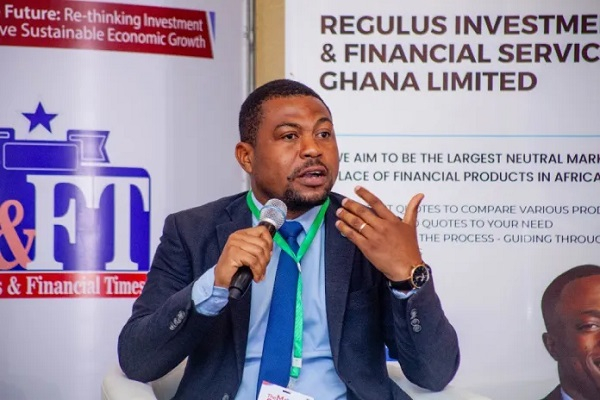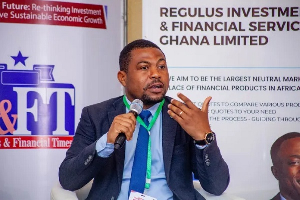The Lead of Monetary Crimes and Anti-Cash Laundering at e-Crime Bureau, Eric Kwaku Mensah, has underscored the necessity for people and most people to remain vigilant and knowledgeable about rising fraud tendencies.
As technological developments proceed to reshape the cyber menace panorama, staying abreast of evolving fraud methodologies, he stated, is paramount to safeguarding oneself in opposition to malicious actions on-line. The cybercrime skilled famous that as fraudsters realise their strategies have been detected, they all the time devise new schemes.
For example, in its ‘Fraud Report’ final 12 months, the Bank of Ghana (BoG) revealed that banks and Specialised Deposit-Taking Establishments (SDIs) recorded 2,998 tried fraud circumstances in 2022, in comparison with 2,347 circumstances in 2021, marking a 27.74 p.c enhance. This rise occurred regardless of renewed efforts to fight cybercrimes. “Complete loss worth recorded in 2022 stood at roughly GH¢56million as in comparison with roughly GH¢61million in 2021. This reveals a 7.88 p.c lower from 2021,” it was acknowledged.
Moreover, it emerged that the key drivers (prime 5) fraud typologies that impacted many of the establishments within the sector included forgery and manipulation of paperwork, fraudulent withdrawals, cheque fraud, cyber/electronic mail and money theft (money suppression). “Forgery and manipulation of paperwork emerged because the distinguished fraud typology. Any such fraud recorded the very best lack of GH¢33million,” the report stated.
Amidst these developments, Mr. Mensah issued a cautionary reminder for people to remain well-informed. He advocated the necessity for vigilance, significantly advising these contemplating funding alternatives to train skepticism in the direction of on-line merchandise promising returns or dividends exceeding business norms.
Mr. Mensah who spoke in an interview on the sidelines of ‘The Cash Summit (TMS) 2024’, organized by the B&FT in Accra, urged the investing public to prioritise due diligence when making funding selections.
He added that this consists of verifying the bodily workplaces or areas, accreditation, or licenses of such on-line companies, in addition to figuring out the people behind them. Mr. Mensah famous that the absence of those particulars are a few of the pink flags that the general public wants to notice.
Nonetheless, he lamented that the weather of greed and ignorance on the a part of some individuals are the contributing elements that result in their victimization by on-line fraudsters. To mitigate these occurrences from a regulatory standpoint, he known as for normal critiques of insurance policies governing the operations of economic and funding companies, significantly inside the fintech house, to align with present tendencies.
“On the regulation enforcement facet, that is the place collaboration is required. So, that after a case of fraud and different cybercrimes are reported, the assorted businesses can successfully work collectively to apprehend the perpetrators,” he acknowledged.
In the meantime, he urged companies to spend money on threat administration methods to proactively detect and considerably scale back, if not fully eradicate, cybercrimes focusing on them.
Moreover, throughout a plenary dialogue on the subject “digitalisation of cash: re-thinking monetary digital transactions for financial development,” Mr. Mensah elaborates on the significance of balancing expertise use with consciousness of fraud schemes and cyber threats related to it. He recognized cell cash fraud as one of many predominant fraudulent schemes in current occasions, together with the rising menace of ‘enterprise electronic mail compromise.’
Richmond Kwame Frimpong, the Advisory Board Chair of Monetary Literacy Africa, who additionally served as a discussant on the subject, expressed concern in regards to the failure of Sub-Saharan African nations to harness expertise to simplify monetary providers. Towards this backdrop, he urged African governments to deliberately make the most of fintech to each drive and regulate monetary providers, emphasizing that this strategy would promote monetary inclusion and literacy.
TMS 2024, an initiative of the B&FT, convened below the theme ‘Investing for the Future: Re-thinking Funding and Financial savings to Drive Financial Progress and Growth.’ This 12 months’s summit introduced collectively influential figures from the monetary sector to debate and devise sensible measures to sort out the difficulty of diminished investor confidence, aiming to reignite a tradition of saving and funding.
The annual occasion occurred amidst considerations in regards to the nation’s low financial savings habits, as Ghanaians traditionally allocate a bigger portion of their revenue to spending slightly than saving and investing. This low financial savings charge, solely barely increased than the sub-Saharan African common, impedes capital improvement and enterprise enlargement, falling considerably beneath international requirements and lagging behind some regional counterparts.



